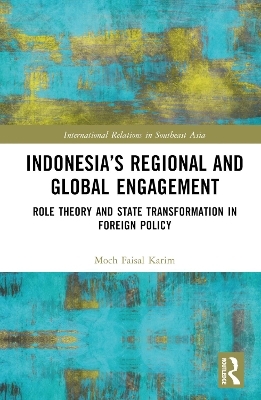
Indonesia’s Regional and Global Engagement
Role Theory and State Transformation in Foreign Policy
Seiten
2023
Routledge (Verlag)
978-1-032-45195-4 (ISBN)
Routledge (Verlag)
978-1-032-45195-4 (ISBN)
Karim examines the changes and continuity of Indonesia’s foreign policy in the post-authoritarian era, under presidents Susilo Bambang Yudhoyono and Joko Widodo.
Indonesia conceptualised and aimed to adopt four principle roles after 2004 – being a voice for developing countries; being a regional leader; being an advocate for democratic and human rights; and being a bridge-builder. These roles, however, were by no means stable and were constantly being negotiated and contested. Karim analyses the contested nature of Indonesian foreign policy and the limits this places on consistency in enacting these roles. He highlights two drivers for such limitations – conflicting role conceptions and state fragmentation. He develops this argument based on four case studies of Indonesia’s engagement in human rights governance and trade governance at both regional and global levels.
Essential reading for students and scholars of Indonesia’s foreign policy, that will also be of substantial value to those studying policy in Southeast Asia more broadly.
Indonesia conceptualised and aimed to adopt four principle roles after 2004 – being a voice for developing countries; being a regional leader; being an advocate for democratic and human rights; and being a bridge-builder. These roles, however, were by no means stable and were constantly being negotiated and contested. Karim analyses the contested nature of Indonesian foreign policy and the limits this places on consistency in enacting these roles. He highlights two drivers for such limitations – conflicting role conceptions and state fragmentation. He develops this argument based on four case studies of Indonesia’s engagement in human rights governance and trade governance at both regional and global levels.
Essential reading for students and scholars of Indonesia’s foreign policy, that will also be of substantial value to those studying policy in Southeast Asia more broadly.
Moch Faisal Karim is a senior lecturer in the Department of International Relations at BINUS University and non-residential fellow at the Center of Muslim Politics and World Society (COMPOSE), Faculty of Social Sciences, Universitas Islam Internasional Indonesia.
1. Introduction 2. Role Theory and State Transformation: A Theoretical Framework 3. The Making of Biographical Narrative: The Evolution of Indonesia’s Role Conceptions 4. Indonesia in Regional Human Rights Governance 5. Indonesia in Global Human Rights Governance 6. Indonesia in Regional Trade Governance 7. Indonesia in Global Trade Governance 8. Conclusion
| Erscheinungsdatum | 11.07.2023 |
|---|---|
| Reihe/Serie | International Relations in Southeast Asia |
| Zusatzinfo | 15 Tables, black and white |
| Verlagsort | London |
| Sprache | englisch |
| Maße | 156 x 234 mm |
| Gewicht | 576 g |
| Themenwelt | Naturwissenschaften ► Geowissenschaften ► Geografie / Kartografie |
| Sozialwissenschaften ► Politik / Verwaltung ► Europäische / Internationale Politik | |
| Sozialwissenschaften ► Soziologie ► Spezielle Soziologien | |
| ISBN-10 | 1-032-45195-5 / 1032451955 |
| ISBN-13 | 978-1-032-45195-4 / 9781032451954 |
| Zustand | Neuware |
| Informationen gemäß Produktsicherheitsverordnung (GPSR) | |
| Haben Sie eine Frage zum Produkt? |
Mehr entdecken
aus dem Bereich
aus dem Bereich
über eine faszinierende Welt zwischen Wasser und Land und warum sie …
Buch | Hardcover (2023)
dtv (Verlag)
24,00 €
Buch | Hardcover (2024)
Schweizerbart'sche, E. (Verlag)
24,00 €
Eine Einführung in die spezielle Mineralogie, Petrologie und …
Buch | Hardcover (2022)
Springer Spektrum (Verlag)
59,99 €


